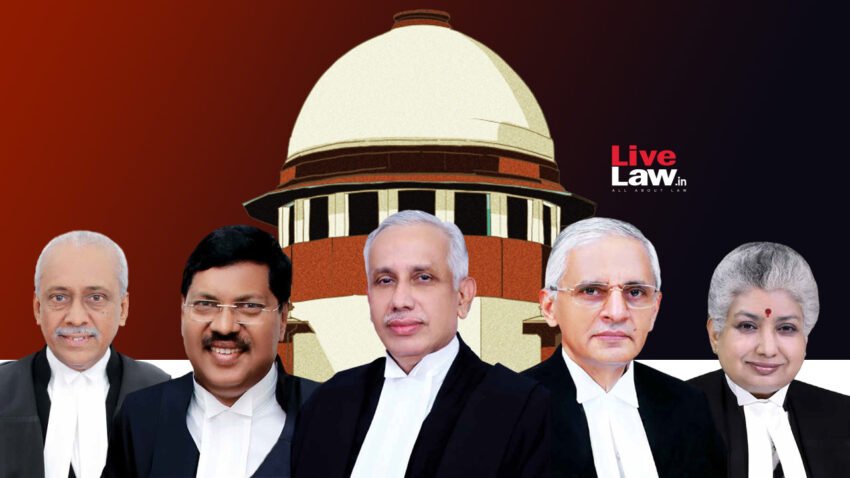3 Jan 2023 10:49 AM
The Supreme Court Constitution Bench comprising Justices S. Abdul Nazeer, B.R. Gavai, A.S. Bopanna, V. Ramasubramanian and B.V. Nagarathna has held that additional restrictions, not found in Article 19(2), cannot be imposed on the exercise of right to free speech under Article 19(1)(a) of Ministers, MPs and MLAs. It held that the grounds mentioned in Article 19(2) for restricting free speech are exhaustive.
In her dissenting opinion, Justice B.V. Nagarathna agreed that greater restriction cannot be imposed on free speech, in addition to grounds under Article 19(2). However, she observed that in case a Minister makes disparaging statements in his “official capacity”, then such statements, In her dissenting opinion, Justice B.V. Nagarathna agreed that greater restriction cannot be imposed on free speech, in addition to grounds under Article 19(2). However, she observed that in case a Minister makes disparaging statements in his “official capacity”, then such statements can be vicariously attributed to the govt. However, if the statements of the Ministers are stray remarks not consistent with stand of govt then it would be treated as personal remark she clarified.
The grounds lined up in Article 19(2) for restricting the right to free speech are exhaustive. Under the guise of invoking other fundamental rights or under the guise of two fundamental rights staking a competing claim against each other, additional restrictions not found in Article 19(2) cannot be imposed on the exercise of the right conferred by Article 19(1)(a), ” the Constitution Bench has held unanimously.
The case emanates from the Bulandshahar rape incident wherein the then Minister of the State of Uttar Pradesh and Samajwadi Party leader, Azam Khan had trivialised the act by dismissing the incident as a ‘political conspiracy and nothing else’. Thereafter the survivors had filed a writ petition before the Apex Court seeking action against Khan. In view of the same, the Court had directed Khan to submit an unconditional apology. While doing so, it had noted that the case raises serious concerns regarding state obligation and freedom of speech and expression and a reference was made to a Constitution Bench in 2017, based on certain questions framed by Senior Advocates Fali S Nariman and Harish Salve, who were appointed as amici curiae.
The Court had reserved the judgment on November 15, 2022. It had framed five questions in the matter:
- Whether a fundamental right under Articles 19 or 21 of the Constitution of India be claimed other than against the state or its instrumentalities? The Bench held:
“A fundamental right under Article 19 or 21 can be enforced even against persons other than the state or its instrumentalities.” ” However, it clarified that a mere statement made by Minister inconsistent with the rights of the citizens may not be actionable as a constitutional tort. But if it leads to omission or commission of offence by a public official then it is a constitutional tort, it added.
2. Whether the state is under a duty to affirmatively protect the rights of citizens under Article 21 of the Constitution even against a threat to the liberty of citizens by the acts or omissions of another citizen or private agency, the Bench held:
“The state is under a duty to affirmatively protect the rights of a person under Article 21 whenever there is a threat to personal liberty even by a non-state actor.”
3. Can a statement made by minister traceable to any affairs of the state or for the protection of the government be attributed vicariously to the government itself, especially in view of the principle of collective responsibility?
“A statement made by a minister even if traceable to any affairs of the state or for protection of the government cannot be attributed vicariously to the government by invoking the principle of collective responsibility,” the majority ruled.
Justice B.V. Nagarathna in her dissenting opinion said that statements made by a Minister, which are traceable to affairs of govt or to protect the govt, are vicariously attributable to the Govt and if they are disparaging, the Govt is vicariously liable. She also expressed concern over rising cases of hate speeches and observed that though Fundamental rights under Article 19(1)(a) and 21 may not be horizontally applicable in constitutional courts, however, Common Law remedies are available to the citizens.
However, the Judge expressed disinclination to issue guidelines to curb disparaging or vitriolic statements by public functionaries, adding that it is a matter for the Parliament to address.
“It is for the party to control the speeches made by their ministers which can be done by forming a code of conduct. Any citizen who feels attacked by such speeches made or hate speech by public functionary etc can approach court for civil remedies,” she said.
4. Whether a statement by a minister inconsistent with the rights of a citizen under Part III of the Constitution constitutes a violation of such constitutional rights and is actionable as a constitutional tort?
“A mere statement made by a minister inconsistent with the rights of a citizen of Part III of the Constitution may not constitute a violation of constitutional rights and become actionable as a constitutional tort. But, if as a consequence of such a statement, any act of omission or commission is done by the officers resulting in harm or loss to a person or citizen, then the same may be actionable as a constitutional tort.”
In 2017, the then Attorney General, Mr. K.K. Venugopal framed four questions as follows :
- Whether any restrictions can be imposed on the Right to Freedom of Speech and Expression under Article 19(1)(a), excluding restrictions already enumerated under Article 19(2)? If yes, then to what extent?
- Whether greater restrictions on Article 19(1)(a) can be imposed, if it concerns persons holding high office?
- Whether Article 21 can be enforced against individuals and private corporations not encompassed under the definition of ‘State’ as per Article 12?
- Whether the State can proceed against individuals under statutory provisions?



